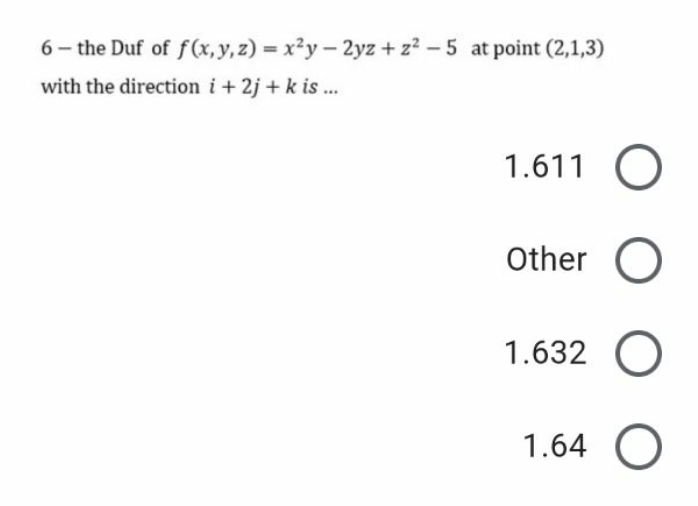Question Number 108947 by mohammad17 last updated on 20/Aug/20

Answered by 1549442205PVT last updated on 21/Aug/20
![We find the angle α,β,γ between the vector m^→ =(1,2,1) and the axises Ox,Oy,Oz cosα=cos{[(1,2,1),(1,0,0)]^(�) }= ((∣1.1+2.0+1.0∣)/( (√(1^2 +2^2 +1^2 .1))))=(1/( (√6)))⇒sinα=(√(5/6)) cosβ=<m^(→) .j ^(→) >/(√6)=2/(√6),cosγ=1/(√6) (df/dm^(→) )=(df/dx)cosα+(df/dy)cosβ+(df/dz)cosγ= =(((2xy)/( (√6)))+(((x^2 −2z))/( (√6)))+((2z−2y)/( (√6))))∣_((2,1,3)) =(4/( (√6)))+((−4)/( (√6)))+(4/( (√6)))=1.632⇒Choose C](https://www.tinkutara.com/question/Q109089.png)
$$\mathrm{We}\:\mathrm{find}\:\mathrm{the}\:\mathrm{angle}\:\alpha,\beta,\gamma\:\:\mathrm{between}\:\mathrm{the}\:\mathrm{vector} \\ $$$$\overset{\rightarrow} {\mathrm{m}}=\left(\mathrm{1},\mathrm{2},\mathrm{1}\right)\:\mathrm{and}\:\mathrm{the}\:\mathrm{axises}\:\:\mathrm{Ox},\mathrm{Oy},\mathrm{Oz} \\ $$$$\mathrm{cos}\alpha=\mathrm{cos}\left\{\left[\widehat {\left(\mathrm{1},\mathrm{2},\mathrm{1}\right),\left(\mathrm{1},\mathrm{0},\mathrm{0}\right)\right]}\right\}= \\ $$$$\frac{\mid\mathrm{1}.\mathrm{1}+\mathrm{2}.\mathrm{0}+\mathrm{1}.\mathrm{0}\mid}{\:\sqrt{\mathrm{1}^{\mathrm{2}} +\mathrm{2}^{\mathrm{2}} +\mathrm{1}^{\mathrm{2}} \:.\mathrm{1}}}=\frac{\mathrm{1}}{\:\sqrt{\mathrm{6}}}\Rightarrow\mathrm{sin}\alpha=\sqrt{\frac{\mathrm{5}}{\mathrm{6}}} \\ $$$$\mathrm{cos}\beta=<\overset{\rightarrow} {\mathrm{m}}\overset{\rightarrow} {.\mathrm{j}\:}>/\sqrt{\mathrm{6}}=\mathrm{2}/\sqrt{\mathrm{6}},\mathrm{cos}\gamma=\mathrm{1}/\sqrt{\mathrm{6}} \\ $$$$\frac{\mathrm{df}}{\overset{\rightarrow} {\mathrm{dm}}}=\frac{\mathrm{df}}{\mathrm{dx}}\mathrm{cos}\alpha+\frac{\mathrm{df}}{\mathrm{dy}}\mathrm{cos}\beta+\frac{\mathrm{df}}{\mathrm{dz}}\mathrm{cos}\gamma= \\ $$$$=\left(\frac{\mathrm{2xy}}{\:\sqrt{\mathrm{6}}}+\frac{\left(\mathrm{x}^{\mathrm{2}} −\mathrm{2z}\right)}{\:\sqrt{\mathrm{6}}}+\frac{\mathrm{2z}−\mathrm{2y}}{\:\sqrt{\mathrm{6}}}\right)\mid_{\left(\mathrm{2},\mathrm{1},\mathrm{3}\right)} \\ $$$$=\frac{\mathrm{4}}{\:\sqrt{\mathrm{6}}}+\frac{−\mathrm{4}}{\:\sqrt{\mathrm{6}}}+\frac{\mathrm{4}}{\:\sqrt{\mathrm{6}}}=\mathrm{1}.\mathrm{632}\Rightarrow\mathrm{Choose}\:\boldsymbol{\mathrm{C}} \\ $$
